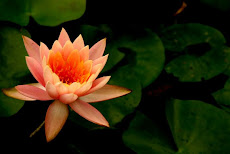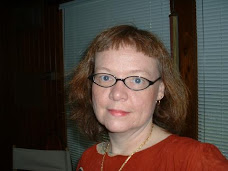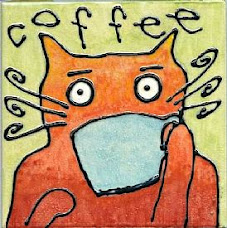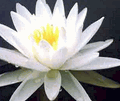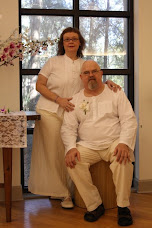Saturday, July 12, 2008
Connecting with Nature
We grow Japanese timber bamboo and Buddha Belly bamboo in our yard, as well as mimosa, hibiscus, and Spanish Bayonet yucca, which makes wonderful huge white blooms in the Spring. Now that Summer his here, our pineapple plant is making fruit. The birds enjoy splashing in our birdbath. We have a patio made of old red bricks in the backyard, and I enjoy going out there in the evening when things are peaceful. Our date palm tree is making fruit, and I love to hear playful squirrels scampering up the tree to munch on the dates. When it is breezy, our Solari bell and wind chimes make beautiful tinkling music. I got a hanging basket of periwinkle, bursting with blossoms, for my birthday last month, and it hangs brightly over our patio, providing a cheerful splash of color. Lush green English ivy covers the patio fence. So that's my daily nature experience. It isn't as exotic as a long hike at Payne's Prairie or a canoe trip down the Santa Fe River, but it works for me!
Sunday, July 6, 2008
Spiritual Autobiography
I saw my grandparents as being vitally important to their small rural community in the Appalachian hills. There were few psychologists, counselors, or social workers in Kentucky in those days. Whenever members of their church became ill, had marital problems, or lost a job, my grandparents were always available for hospital visitation, pastoral counseling, or to provide networking and support for members of their beloved community. From my point of view, their ministry exemplified what a spiritual community should be.
After I graduated from college, I married a young man who was Catholic, and I converted to the Catholic faith. I enjoyed going to Mass. I loved the ritualistic nature of the liturgy, the chanting, and the incense. When we divorced after seven years, I kept going to Mass for awhile, but I began to notice that divorced women were not particularly valued by the Catholic church, so I stopped going.
Soon after, I became friends with a woman who read Tarot cards as a hobby. I found the Tarot fascinating. I decided to enroll in a community education class in Tarot reading at a community college. I met some people in the class who were practicing Wicca. I became intrigued with Goddess worship and the pagan religions. I started reading everything I could find about the earth-based traditions.
Over the next couple of years, I attended workshops with Margot Adler, Selena Fox, Luisa Teish, and Starhawk. I was captivated by the concept of the Goddess as a Divine Mother. I loved the idea of a female deity, as something had always been lacking for me in patriarchal Christianity. The Goddess became a personal maternal figure for me as well, which is something I had been missing for most of my life.
The following year, my sister got married to a gentleman who was a Unitarian Universalist. I had never heard of the UU faith before meeting my brother-in-law. The idea of a church that draws upon the wisdom of all the world’s religious traditions intrigued me, and I eagerly became a member of our local UU congregation. I have now been a Unitarian for fifteen years. Over the years, I’ve taught a UU women’s spirituality course called Cakes for the Queen of Heaven, I’ve been involved in rituals with the Covenant of Unitarian Universalist Pagans (CUUPS), and I practice Zen Buddhist meditation with a group called the UU Azalea Sangha.
I met my current spouse Jack at the UU church in 2003. He is very interested in the teachings of Vietnamese Buddhist monk Thich Nhat Hahn. In 2005, we traveled to Denver to see Thich Nhat Hahn give a public talk while he was teaching in the United States. We’ve read several of his books. Jack and I studied with a local Order of Interbeing sangha, based on Thich Nhat Hahn’s teachings, for several months. We also sometimes attend a Tibetan Buddhist meditation group.
Jack and I were married on February 10, 2008. This has been a very positive transition in my life. Another transition I would like to make is to expand my career as a psychiatric nurse practitioner into pastoral counseling. Because my spirituality is so important to me, I would like to develop a pastoral counseling practice that focuses on spirituality as a path for personal growth and well-being. In order to accomplish this goal, I’m seeking ordination as a pastoral counseling minister.
(Written on April 30, 2008)
Friday, July 4, 2008
Attachments
Blondie is curled up on a little blanket, and appears woozy from her analgesic. The tech places her gently on the exam table. I fold my arms around Blondie in a loving embrace.
I found her as a tiny stray kitten while vacationing in Key West in 1994. As I walked up the front steps of a museum to see an exhibit about a Spanish shipwreck, I spotted a litter of kittens huddled together beneath the steps. I kept thinking about those little cuties as I toured the exhibit. On the way out of the museum, I scooped up one of the kittens and carried her back to my hotel room. That was the beginning of my 14 year relationship with Blondie.
The vet comes in to the exam room and gives me a hug. She says Blondie told her today that she wants to go to kitty heaven. I am sad, but I realize that this is one of the responsibilitites of pet ownership. Pets trust their humans to take care of them, and sometimes this care includes relieving their suffering by letting them go. It is difficult to say goodbye. I have loved her completely, as much as any woman could love any cat.
The vet tells me that Blondie will always be with me, and that she will be chasing butterflies in the spirit world. She slowly administers the drugs that will allow Blondie to drift off to sleep. As the medication takes effect, I kiss Blondie's forehead and gently stroke her little platinum chin, which is the physical trait that earned her the name "Blondie". I say her name softly and tell her I love her so that her mommy's voice will be the last sound she hears as she leaves this world.
We bury our dear little Blondie in the backyard that evening, under a Japanese timber bamboo. I order a little stone engraved with her name over the internet from a pet memorial company. I tell Jack that it comforts me to know that Blondie is no longer suffering from cancer.She was a gregarious and affectionate little soul, very agile and bright, and a devoted companion. She always liked to be close, curling up right next to me at every opportunity. She was so honest about her feelings, with her expressions written all over her gray-striped kitty face. I will miss that little Miss Tigerpants, with her ruddy nose, spotted belly, and black feet. Blondie lived fully until the final day of her life, purring and trying weakly to "make biscuits" on my stomach as she lay with me on our living room sofa, while the cancer raged throughout her gaunt furry frame. She even made her familiar little chortle sound, letting me know that in spite of her terrible pain and failing health, she loved being with me.
This is a time when the universe is teaching me to accept loss. My sister died just before the holidays last year, and my uncle was diagnosed with bladder cancer soon after that. One of my cousins in Kentucky was recently diagnosed with liver cancer, and is not expected to survive more than a year. He is 56 years old. Many of my long-term attachments to this world are slipping away. This leaves me in an uneasy space. I would prefer not to be in this space, but the universe did not ask my opinion.
A Buddhist friend suggested performing rituals from "The Tibetan Book of Living and Dying". She said that making donations to charities each week after Blondie's death up to 49 days, making offerings, lighting a candle, saying prayers and visualizations can help her in the Bardo and can influence her next life.
Another Buddhist told me that the Dalai Lama wrote in his autobiography that his cat died with an injury. A while later a cat brought her kitten to him. It was crippled where his old cat had the injury. Maybe Blondie will be reincarnated, and we will be together again in some future life.
(Blondie died on July 1, 2008)
Saturday, May 3, 2008
Spirit World Dream
In my dream, it was a perfect warm sunny day with few clouds in the sky. Carolyn stood under a huge live oak tree. She wore a pink flowered dress with puffy sleeves and a full skirt, a style she liked when she was young. Her long chestnut hair, glistening in the sun, framed her smiling face. She looked so happy and peaceful. A butterfly fluttered by. Carolyn was surrounded by a small group of nebulous others, women, I think. I couldn't tell who they were. Maybe they were her friends from happier times, before she got so depressed. Perhaps they were the beloved women of our family, our late mother Iris and our grandmother Vergie, as well as our dear late aunts Leafie and Pat.
Carolyn's broad smile and easy laughter let me know that she is okay. Wherever she is now, she is happy, peaceful, and loved. I do not know if or when she will reincarnate, or if our paths will ever cross again. Even though she struggled with her own deep troubles, she was always only a phone call away or a day's drive up the interstate when I needed advise from a big sister. I wish that she could be that big sister to me again.
Time will tell whether Carolyn will visit me again from the spirit world. Will she come to me in my dreams even if my rational self knows that it is merely a wishful figment of my imagination? Native Americans believed that the spirits of those who were deceased could visit them through their dreams. Since our family's heritage is part Cherokee, I guess I don't find it totally out of the realm of possibility that this phenomenon can happen. At least I hope it does.
Wednesday, March 26, 2008
Diamonds, the Buddha, and the Beach
A former college president, my dad spent the later years of his career as an educational advisor to the U.S. Navy's flight school program and taught as an adjunct at a local university. After I graduated from college, I had little contact with my dad. He was a quirky, introverted type, and in the years following his retirement, he lived almost reclusively with his wife in the pine woods of the Florida panhandle. He seemed to have little interest in me. I was seldom invited to his house for the holidays, and some years I did not even receive a birthday card from him.
At the chapel, a small crowd of friends and relatives has gathers the service. The minister asks to meet with the family in the study behind the chapel. In the study, my dad's wife drops a small velvet pouch into my hand and tells me that he wanted me to have it. I open the pouch, and my dad's chunky diamond ring that he wore for many years twinkles up at me. I am very surprised. I am at a loss for words, and the only response I can think of is a simple "thank you."
Later back at the hotel, Jack suggests going out on the beach after dinner. We pick up a bottle of chardonnay and stroll down to the beach. We sip our wine and enjoy the sunset. The Gulf of Mexico's waves roll gently against the shore, like meditative breathing, with long slow rhythmic inhalations and exhalations. The chardonnay we are sharing is the most delicious wine I have ever tasted. Jack and I sit close together in the sand, our arms around each other, snuggling. I feel warm, safe, and loved. We stay on the beach until after dark and we can no longer see the ocean. We listen to the sounds of the surf. I am so happy to have Jack here with me. Our relationship is worth more to me than a sea of diamonds.
Psychiatrist Karl Menninger wrote that our lives are shaped by those who love us as well as those who refuse to love us. I believe that my dad, like most folks, did the best he could. As I look back, I realize that there are some things I could have done differently as his child, but I, too, was doing the best I knew how at the time.
The Buddha said that the past is already gone, and the future is not yet here. There is only one moment for us to live, and that is the present moment. Vietnamese Zen master Thich Nhat Hahn teaches us to say "I have arrived, I am home" in our meditation. I love this mantra. This helps me to live in the present moment, right here and now. My home is in my heart. I no longer feel all the anger and resentment that I did in my youth about the home from which I came. I just finished reading Elizabeth Gilbert's book "Eat, Pray, Love". She says our life's work is to take the circumstances in which we find ourselves and create something beautiful and meaningful out of them. I think that's fabulous advice. I will turn 50 this year. I think her advice is a pretty good goal for the second half of my life.
Sunday, March 23, 2008
Career Behind Bars
I pull into the parking lot at the state women's prison. This isn't what I thought my career would be like. I wanted to be a mental health professional and a nurse practitioner. I never dreamed that I would be practicing in this type of environment. In graduate school, I discovered, to my dismay, that if you want work with the mentally ill in Florida, a large segment of this population is in jail or prison. This is the result of a movement called deinstitutionalization, in which thousands of psychiatric patients were released from state mental hospitals over the years and mainstreamed into community mental health programs. Because the community mental health centers are generally underfunded and not equipped to provide adequate services for Florida's mentally ill, many of these patients are at increased risk for getting in trouble with the law. Detention centers and correctional institutions have become the de facto psychiatric treatment facilities.
My entry level position in the prison system is counseling in a substance abuse treatment program. Many of the women in my program have only a middle school education, were physically or sexually abused as children, and have been using drugs and alcohol since their pre-teen years. Some have limited reading skills and have never been gainfully employed. My patients tend to be underdeveloped as people, because of the aversive circumstances under which they were raised (poverty, abuse, neglect, etc.). Some of the women have never played softball, planted flowers, written a poem, or baked cookies. Even though prison is an oppressive environment, it provides a structured setting where the women can learn life skills and and try to build an existence that doesn't revolve around cocaine, heroin, or booze. Some female inmates have practiced prostitution in exchange for drugs, or just to keep a roof over their heads. Others have lost custody of their children because of criminal records and substance abuse problems. A few have made suicide attempts by cutting in the past, and bear scars on their wrists to show for it. Several of the women have never belonged to a church and have no religious or spiritual affiliation. Some have borderline intellectual functioning or mild mental retardation. Most have suffered from depressive episodes. Some are youthful offenders, and are as young as age 15.
Fast forward to 2008, and I am heading west on State Road 16 in Raiford, Florida, towards my current practice site, a maximum security men's prison. I'm listening to Jack Kornfields's CD "The Wise Heart, A Guide to the Teachings of Buddhist Psychology" as I commute. I park my 2001 silver Toyota Echo in the employee lot and enter the facility. I insert my right hand into a fingerprint scanner in the sallyport. A correctional officer searches my handbag. A heavy iron gate clangs shut behind me, and I enter the compound where just over 2000 prisoners are housed.
As a mental health professional with 20 years of experience, I am now the psychiatric provider and prescriber for a 60-bed long-term inpatient psychiatric unit for closed management inmates with serious mental disorders. During a departure from the prison system, I was the Director of Mental Health at a county jail for a couple of years, I practiced as a primary care and psychiatric ARNP with the Veterans Administration for a time, and even tried my hand at private practice. In 2007, with the prospect of turning age 50 looming large, I decided to return to the prison system and get a few more years in the state retirement system.
Most of my patients in my current practice suffer from schizophrenia, bipolar disorder, antisocial personality disorder, or borderline personality disorder. Our treatment team includes a clinical psychologist, three mental health counselors, and a psychiatric nurse. Many of the patients in my unit are serving life sentences for sexual battery or murder. Two of my patients have killed other inmates since they have been in prison. A few of my patients are sentenced to death. Several are living with HIV. Some have suffered head injuries resulting in seizure disorders, as well as permanent changes in personality, judgement, impulse control, and cognitive functioning. Others have survived gunshot or stab wounds. The majority were substance abusers prior to incarceration. Many of my older patients are being treated for chronic illnesses such as diabetes mellitus, heart disease, and emphysema, in addition to their mental disorders. One of my patients amputated his penis with a razor blade during a psychotic episode. Others engage in bizarre behavior such as smearing feces when they are severely agitated or not in touch with reality. One of my patients suffers from the fixed delusion that he has a transmitter implanted in his brain and the warden can hear his every thought.
The correctional officer in our building's control room buzzes me in through a series of locked doors. In my office, I brew some Starbucks Breakfast Blend coffee in my Mr. Coffee machine, tune in to NPR on the radio, and boot up my computer to check my email. Next I will move into my daily routine of seeing patients for psychiatric evaluations, mental status examinations, and monthly psychotropic medication check-up visits. I do the best I can to treat my patients' mental disorders and relieve their suffering. Some days I feel as though I accomplish nothing at all. Therapeutic victories here are modest and infrequent.
There is nothing glamorous about my career. Sometimes I have difficulty finding meaning in my my work, and I am ambivalent about continuing. Not only is the clinical work taxing and sometimes unrewarding, the politics of a government position can be thorny and complex. I am grateful for my experience behind bars, because it has given me the opportunity to learn about aspects of human nature to which I would never have been otherwise exposed. Over the years, I have worked with so many patients whose souls are severely damaged and scarred. These patients are victims as well as victimizers, caught in a cruel karmic circle that turns over and over upon itself. For most of them, ending this cycle will have to occur in another lifetime. Their karma probably cannot be repaired in this life.
I pull on my white labcoat, grab my coffee mug and an ink pen, and head into the ward.....
Saturday, February 23, 2008
Letter to Carolyn
At the UU Fellowship in Auburn, your flower-draped casket occupied the same space where you and I stood, along with other members of your wedding party, almost twenty years before on the day of your marriage. I was in my frilly blue bridesmaid dress and you wore a cascade of white taffeta and chiffon. You were radiant on that warm sunny June afternoon, without a trace of the undercurrent of dark depression that surfaced from time to time, fracturing your fragile inner world. Still, I never dreamed that you would someday become completely engulfed in a darkness so black that you believed the sun would never shine again.
Your funeral, on that cold December day, was a blur of fragrant pastel floral arrangements, classical music pieces you loved streaming softly from the piano, your friend Tom reciting a poem he had written for you, and a Christian scripture being read from a leather-bound Bible. In a fog I heard someone playing a bluegrass tune on a mandolin, the UU minister speaking at the podium, and Uncle Jim and Aunt Gale singing “Spirit of Life” from their second row seats behind me. Through a haze I could see the your photographs, both as a girl and as a woman, that I had placed carefully on the altar table on either side of the chalice.
When the sleek white hearse backed up to the church, to carry you on your final journey here on earth, it seemed unreal, like a scene from a sad movie. Was all this really happening around me? Jack and I were instructed to pull our vehicle in line for the cemetery procession. I rolled down the window on the passenger side. Your friends from the library leaned in, hugging me one after another, all offering comforting words. Were you watching from above, or from some other place? Were you watching at all, or are you just simply gone now? I can’t quite wrap my mind around the concept of your death. None of it seems to make sense.
I have never lived on this earth without a sister. You have always been there, throughout my entire life, as you were the firstborn. Now I’ve entered a new phase, where you are no longer a part of my life. Who will be my sister now? Herman Hesse wrote that the gift of despair makes it possible for us to start a new life. Sadly and relucantly, I am starting over without you. Losing you makes me think about reorganizing my priorities and values. Should I do something different? Should I quit my job and go live for awhile in an ashram in India? The idea has potential. Our parents are dead, and I have no other siblings. I have few family members left to keep me rooted in the South. I have Jack, and he would gladly travel with me.
Silver strands have started appearing all throughout my hair. You and I will never be little old ladies together in our golden years, and that makes me sad. I am also sad that you didn't live to enjoy your retirement, after 25 years at the library. It was a fabulous season for azaleas this year. Our front lawn was awash in lavender, deep pink, and pure white blossoms for most of February, like a scene from a watercolor painting. I sure wish you had been here to see it.
Saturday, February 16, 2008
Newlywed Notes
We spent this afternoon touring the Harn Museum of Art at the University of Florida, visiting Rodin sculptures, a Monet painting, a wonderful piece by my favorite artist Georgia O’Keeffe, some Andy Warhol silkscreens, and a photograph of a craggy-faced Abraham Lincoln taken in 1864. We stopped for a moment to snuggle on a sofa in an alcove at the museum. I asked Jack if he feels “married”. My fingers lightly brushed the heavy gold ring on his left hand. He said yes, he does feel married. I replied that I don’t feel any different than I did before our wedding. Jack said that’s okay.
We also saw some wonderful Asian Ming Dynasty vases today at the Harn. As we looked at the exhibit, a uniformed docent walked by, and I commented to her that I wished I had lived during the Ming Dynasty, because their artwork was so impressive. She said that women weren’t treated very well during those times. I said that may be true but at least they had beautiful vases. She frowned and hurried away, not appreciating my humor.
Earlier today, I took our 14-year old tabby to the All Cats Clinic for a follow-up appointment. She was recently treated for a serious kidney infection from which she fortunately recovered, in spite of her advanced age. As I sat with her in the waiting room, a woman came in with a cat in a carrier, and told the receptionist that she had come to have her cat put down. The receptionist asked her to have a seat. As we waited, a faint frail mew came from the carrier, and the woman whispered softly to her dying cat,“It’s okay, I’m here, I’m here.”
For a minute, I felt overwhelming sorrow for the woman and her pet. I took a deep breath, closed my eyes, and began to meditate. As my mind became quiet, I realized how fortunate the kitty was to have a caring human to ease her suffering and be there with her until the end. I smiled at the woman. She smiled back, a little sadly.
A few days before our wedding, my aunt in Kentucky sent me an email saying that my uncle had just been diagnosed with cancer and they would not be able to attend the wedding. He is scheduled to have surgery next week. I was disappointed that they weren’t able to make it to our wedding, but I am optimistic about his recovery. Life has its perpetual cycles of ups and downs, and everything is impermanent. The only thing that is permanent is change. During our little honeymoon at the beach in St. Augustine, I bought my aunt and uncle some books I know they will enjoy – a history of St. Augustine for my uncle and a cookbook for my aunt. I also emailed them a wedding portrait of Jack and me, in an attempt to make the best of the situation. I’m sure they would have rather been at our wedding than at the hospital.
I have experienced my share of joys and sorrows. My only sister died unexpectedly only two months ago, just before Christmas, and now my uncle has cancer. Our cat was very sick, but survived her illness. For Jack and me, all is well in our world. When we were driving away from the Unitarian Universalist church after our wedding ceremony, mylar balloons and “Just Married” flags flapping in the breeze, I told Jack that it was the happiest day of my life. I thoroughly enjoyed the celebration of our marriage that morning, but in my heart I had already felt for quite some time that Jack and I were already married. Our ceremony affirmed the way we already felt about each other, rather than making anything different.
The future may once again bring us times that are not auspicious, but for right now, in the present moment, Jack and I are happy. The present moment is the whole world. We ate lunch at the museum’s outdoor café, near a beautiful pond filled with papyrus reeds and lotus blossoms, in the warm sunshine. Life is good, we are newlyweds, and this is our time to be happy.
(Jack and Shelby were married on Febuary 10, 2008)













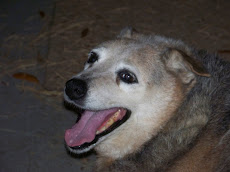
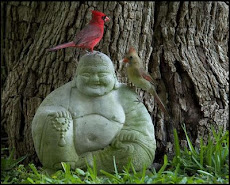.jpg)









